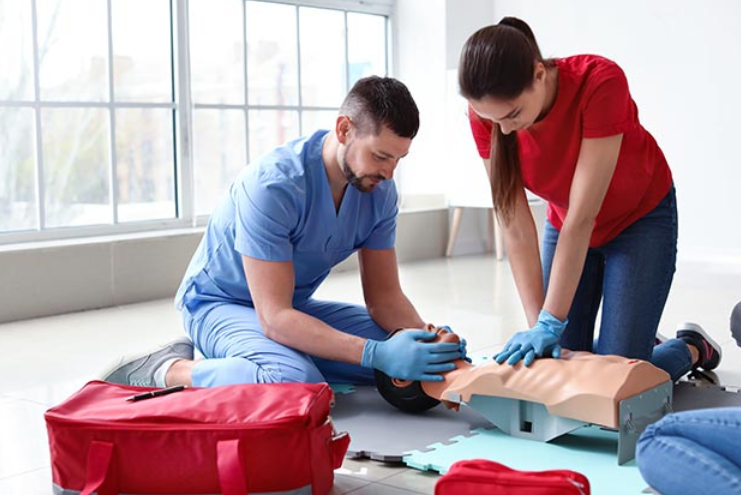CPR AED Certification vs. Basic First Aid Training

Accidents can happen anytime, anywhere. That’s why learning life-saving skills makes a big difference. However, when it comes to training, people often wonder if they should get CPR AED certification in Jacksonville, FL, or start with basic first aid training. These two courses may sound similar, but they prepare you for very different things. Let’s break it down so you can figure out what suits your needs and when each skill matters.
CPR AED Certification in Jacksonville, FL vs. Basic First Aid Training
CPR AED training is all about helping someone when their heart stops or they stop breathing. It prepares you for those sudden, scary moments when someone collapses and needs help right away. In this training, you learn how to press on the chest to keep blood flowing, give rescue breaths if needed, and use a special device called an AED that helps restart the heart. That’s the main focus, and it’s enough to save a life. The steps are quick to learn, but they make a huge difference in those first few minutes before emergency help arrives.
Now, first aid training is a little different. It’s more like a complete set of tools for common injuries. Instead of focusing only on the heart and lungs, it teaches you how to help someone who’s awake but hurt. For example, if someone has a burn, a cut, or a broken bone, first aid gives you clear steps to follow. While CPR and AED deal with life-or-death moments, basic first aid helps you handle a wider range of everyday problems safely and calmly.
So, When Do You Need Each One?
That depends on the situations you might face in daily life. Here’s a quick look:
CPR AED Certification in Jacksonville makes sense if:
- Your job involves caring for children or seniors, where sudden emergencies can happen without warning.
- You’re part of a sports team, fitness club, or security staff where people may collapse from heart-related issues.
- There’s a strong chance you’ll come across someone who stops breathing and needs fast action.
First Aid training fits better if:
- Outdoor activities like camping, or fieldwork, are part of your regular routine.
- You spend a lot of time looking after toddlers or infants who may get into accidents easily.
- You’d rather feel prepared to manage burns, sprains, bleeding, or choking while waiting for help.
See also: What Are Dental Implants and How Do They Work?
CPR AED Training Focuses on Speed and Confidence
When someone isn’t breathing, every second matters. CPR AED certification in Jacksonville, FL, teaches you how to take charge quickly. You won’t waste time wondering what to do next. You’ll know:
- How deep to press during compressions
- When and how to use the AED
- How to check for breathing and response
First Aid Gives You Everyday Tools
Not every emergency needs chest compressions. Sometimes, it’s a nosebleed that won’t stop. Other times, it’s a burn from a hot pan. First aid training gives you step-by-step actions for those smaller, but still serious moments.
It covers things like:
- Bandaging cuts and scrapes
- Helping with allergic reactions
- Cooling burns the right way
- Handling broken bones or sprains
- Watching for signs of shock
Can You Learn Both?
Yes, and it’s actually quite common. Many people choose to take both CPR AED certification in Jacksonville and basic first aid training, especially since several training centers offer them together in a single course. CPR AED usually takes less time to complete, while first aid goes into more detail, so it runs a bit longer. Still, both are beginner-friendly and clearly taught. You can choose to take them on the same day, or start with one and return for the other when you’re ready.
How Long Do Certifications Last?
Once you complete either training, you’ll receive a certificate. Most of these certificates are valid for about two years. After that, you’ll need to renew them. This isn’t just a formality; refreshing your knowledge helps you stay sharp and ready. Skills can fade if you don’t use them, so a renewal course brings everything back to the front of your mind.
In some jobs, keeping your certification up to date is required. For example, if you work in a school, a daycare, a gym, or a healthcare setting, your employer may ask you to show valid proof of training every couple of years.
Conclusion
You don’t have to choose between helping someone breathe or stopping a bleeding wound. In the real world, both CPR AED certification in Jacksonville, FL, and basic first aid training come into play. A person could collapse from a heart attack, and someone else might fall and hit their head minutes later. You never know.
So the question isn’t which training is better. It’s more about what skills you want to walk around with. Some people start with CPR AED, then take first aid later, while others start with a full combo course. Either way, you’re doing something that could save someone’s life or make their worst moment a little less scary.Sign up now at CPR Training Clinic and get certified today.




